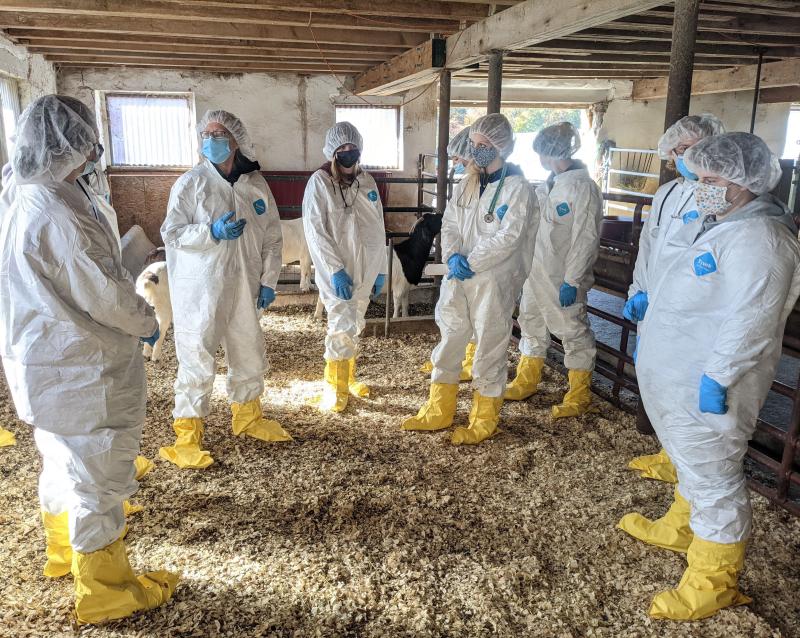DelVal Students Practice Managing a Mock Disease Outbreak

Students worked alongside leading USDA and Pennsylvania Department of Agriculture experts to manage a mock disease outbreak.
On Saturday, Nov. 6, approximately 57 Delaware Valley University students spent the day participating in an exercise that may someday save lives. The University partnered with the USDA’s Animal and Plant Health Inspection Service and the Pennsylvania Department of Agriculture to host a mock disease outbreak. The exercise brought students and faculty from a variety of majors together to practice valuable skills. The students had a chance to work alongside leading experts including veterinarians and epidemiologists.
Dr. Linda Detwiler ’80, a DelVal dairy science alumna who works for the USDA, volunteers to plan the event each year. Dr. Detwiler is a veterinarian and leading animal disease specialist who has been a part of preventing and controlling outbreaks that have spread from animals to humans.
“I think the drills provide students with a chance to see how we would handle a disease outbreak in the real world,” said Dr. Detwiler of the exercise. “The actions they practice are what we actually do.”
Dr. Detwiler said she feels solving problems like a mock disease outbreak allows students to practice the critical thinking skills employers want to see.
As a DelVal alumna, she also enjoys coming back to campus to work with the students.
“I’m always impressed with their enthusiasm and their ability to work through the exercises,” said Dr. Detwiler. “I also appreciate the assistance provided by faculty with expertise in the non-veterinary elements of the exercise such as environmental science.”
In the mock outbreak scenario, a woman was sickened with “X Fever” after coming into contact with livestock on the campus of “Anywhere University.” “X Fever” was modeled after an actual disease.
Students broke up into groups based on their majors to see how their fields would contribute to managing a real-world outbreak. The students conducted research, examined livestock on the University’s farms, conducted interviews of farm managers, assessed the environment and the role of wildlife, and developed an action plan to contain the disease outbreak. A group tasked with communicating with the public even took questions at a mock press conference.
“It was good to learn about how a disease outbreak would be managed and, how different organizations have roles in talking about and preventing the spread of an outbreak," said Drake Fleet '22, a DelVal history and public policy major, who was part of the communications team in the scenario.
Connor Kramer ’22, a small animal science major, said the exercise gave him a “glimpse at the inner workings of an outbreak.”
Emily O’Donnell ’23, a small animal science major who wants to be a veterinarian, was excited to gain more experience in her field.
“I think participating helped me by giving me hands-on experience with animals,” said O’Donnell. “Someday, I will actually be treating animals with diseases.”
The event was part of One Health Week, which offered students a variety of fun and educational ways to learn more about One Health. One Health is a multi-disciplinary approach that works locally, regionally, nationally, and globally to attain optimal well-being for people and society, the environment and plants, and animals. Together, the three major components make up the One Health triad, and the well-being of each is inextricably linked to the others in the triad.
One Health Working Group Chair Reg Hoyt, who also co-chairs the University’s Department of Animal Biotechnology and Conservation, helped organize One Health Week.
“I hope the students recognize the importance of a One Health approach to solving problems,” said Hoyt. “This exercise demonstrates the importance of a transdisciplinary approach.”